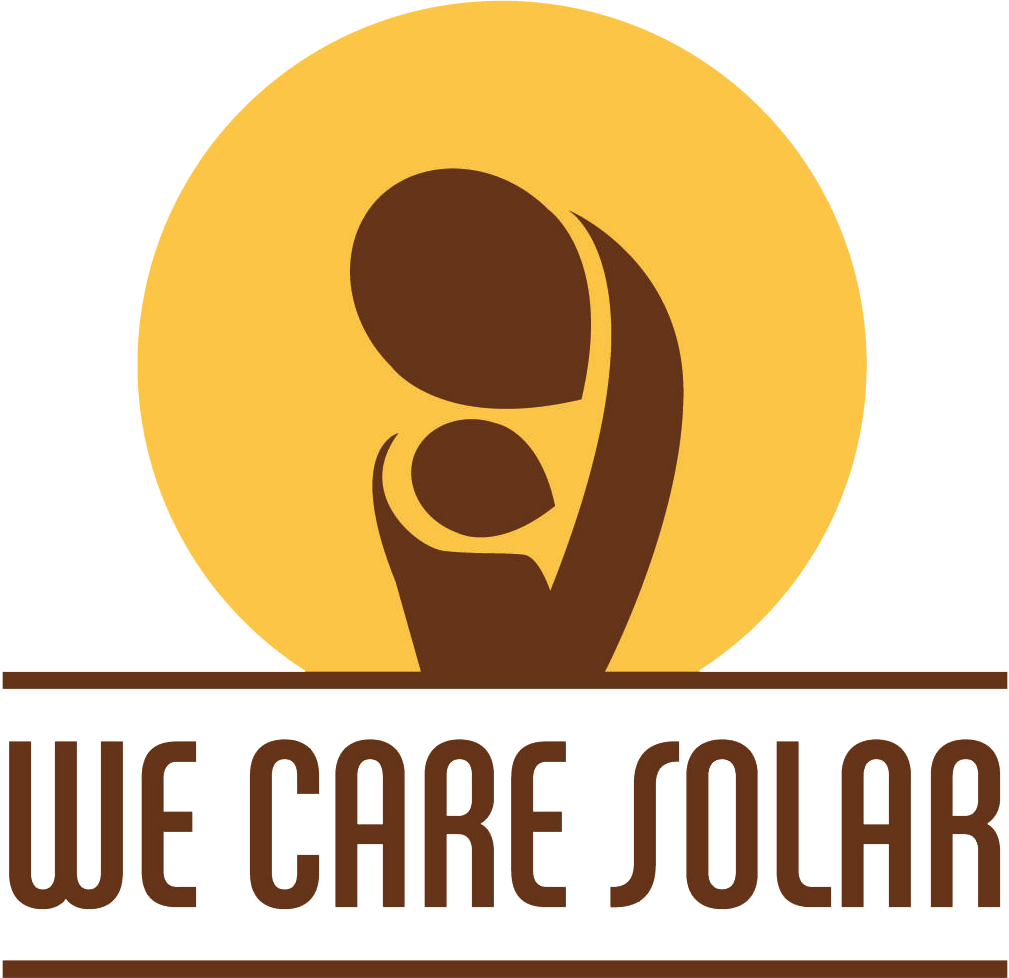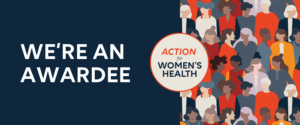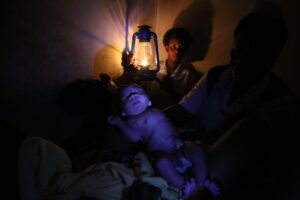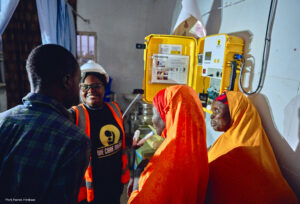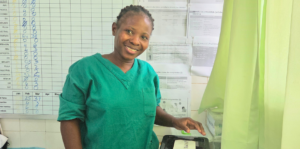The WE CARE pilot solar installation ended on an extremely high note.
The project achieved the following:
· Four sets of solar panels were mounted,
· Seventeen overhead lights were permanently placed, covering llighting needs for the operating theatre, delivery room, maternity ward and eclampsia ward,
· LED headlamps were distributed to night duty clinical staff on every ward, and to pharmacy and laboratory night duty staff members,
· Four sets of sealed deep-cycle batteries were installed and used to support night-time lighting as well as charging stations for wallkie-talkies and LED headlamps in three locations,
· Six brand new ICOM walkie-talkies were distributed and put into immediate use by the emergency obstetric staff, and
· A brand new solar powered blood bank refrigerator was installed to enable the long-term storage of blood at a consistent temperature!
The formal commissioning became a considerably bigger event than I had initially realized. A gentleman from the national radio station came to interview me in the morning, three women from a local television news station filmed and recorded me, and then the entire event was videographed by two fellows commissioned by the Population Reproductive Health Partnership (PRHP) and The Blum Center for Developing Economies.
The hospital staff worked to clean up the operating theatre and hospital grounds. Three large awnings were erected on the lawn outside of the operating theatre. As guests assembled, several long-term VVF patients (women who received surgical repair and education after enduring a terrible complication of pregnancy) chanted and sang to the beat of an African drum. While the final assembly of 150 -200 awaited the arrival of the Health Commissioner, I was asked to dance to the music. This of course, brought howls of laughter from the crowd.
When the honorable commissioner arrived, the formal proceedings could begin. The Master of Ceremonies for the event was Dr. Ado, a member of the PRHP and himself a Nigerian Ob/Gyn. He introduced the honored invitees, and respectfully invited them to take seats in the front row. The audience included hospital staff, medical staff from the Teaching University, the PRHP members, Sarki’s from three villages, the hospital staff, and community friends of the hospital. The entire group was led in Islamic and then Christian prayer.
Next, Dr. Muazu, the head of the hospital, talked about this momentous occasion, and the productive collaboration that led to the physical upgrades of the hospital. Dr. Shittu, director of PRHP, talked about the PRHP training program and introduced some of the community projects that are underway. He emphasized that the solar electric project was the fruition of a research effort, and emphasized the potential links between research and action.
When I was asked to talk, I first acknowledged the generosity and kindness of the hospital staff, who opened the doors of their hospital to me a year ago, and allowed me to shadow their activities for many weeks. I reviewed the tragic maternal mortality statistics in Nigeria, which let to my interest in studying emergency obstetric care in Northern Nigeria. I talked about my work as an American Obstetrician, and my concern in seeing as many complicated obstetric cases in my first week of observations, as I had in my entire career in the U.S. After acknowledging the tremendous dedication of the Nigerian clinical staff, I expressed my concern about the hospital conditions that present barriers to effective and efficient emergency care. And I ended by reminding them that all of the technologies that were installed would only improve maternal and neonatal mortality if they were adopted and well-utilized by the staff.
After my speech, the charge nurse for labor and delivery spoke. She recounted her initial trepidation when she learned an American doctor would be observing her, how she soon became appreciative of my presence and teaching, and how much she thought the lighting and emergency communication equipment would aid their work. She ended by reminding the crowd that no woman should have to die in childbirth. “All women should survive the birth of their child,” she concluded.
Then the Commissioner, Dr. Yari Everton Peter, spoke. He appreciated my efforts to complete this project. He talked about the manner in which some religious people pray in the hope of reaching heaven one day, while others may clearly reach heaven through their actions. He emphasized the difficulties that face Nigerian health workers, but also emphasized the importance of a strong work ethic and positive attitude towards patients. He gave his strong approval for the WE CARE initiative, and emphasized that many lives will be saved by these interventions.
When the program concluded, we all moved towards the Operating Theatre where I described the functioning of the system and the Commissioner formally turned on the lights and the suction machine. We were commissioned!!
The festivities didn’t end there. Dr. Peter called me aside and invited me to be his special guest at a GALA in the state capital that evening. This was another wonderful event that included multiple performances by Nigerian musicians and dancers, representing various tribes throughout Nigeria. At this event, Dr. Peter introduced me and announced my work to the crowd of dignitaries. This prompted a swarm of media professionals to contact me.
But the best was yet to come. Dr. Peter told me he had met with the state Governor and informed him of my work. Now I was invited to speak directly with the Governor! An appointment had already been arranged by Dr. Yari for meeting in the Governor’s House the next day! This was the same day I was schedule to leave the country.
I had to pull together all the loose ends of the project, pack, settle my bill, and meet with several nurses and doctors by 9 am the next day in order to safely make the appointment with the Governor. Somehow I pulled off the impossible, and was soon riding towards the state capital.
The Governor’s House is home to the state assembly and I entered a large assembly hall filled with cameramen. A mission of 28 American doctors were there to receive a formal appreciation from the governor. I was introduced separately and was invited to speak about the WE CARE project. I tried to weave a quick summary of the research that led to the intervention, and the reasons that each of the components of the project can reduce the third delay that contributes to maternal mortality.
The governor, His Excellency Arc. Mohammed Namadi Sambo, listened intently. Then he got up and told the entire room that he thought power and health care was a big problem in Nigeria and that the WE CARE solution is BRILLIANT! He talked about the work his administration had done to provide free maternity and child health care. He commended the WE CARE initiative, presented me with a beautiful Nigerian dress, and talked about the potential for replicating this work in other places in Nigeria.
At the end of the formal session I spoke with Governor Sambo directly and gave him some of the WE CARE material. He gave the green light to the Commissioner of Health, who took me outside and told me we could get going with scaling this project to other institutions. I told him I would need a needs assessment of the other facilities, to which he agreed, and we made plans to work on this after I arrive home.
SO…..WE CARE has just taken a VERY BIG STEP…and our dreams of scaling this project to other medical facilities may come true much sooner than we expected. Thanks again to all of you who dedicated your talents and financial support to this pilot installation!
